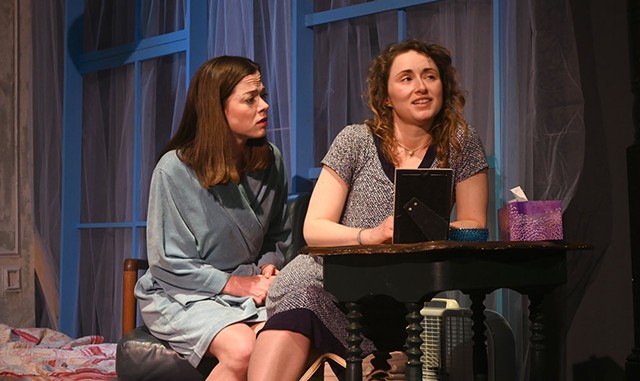
- Courtesy Of Linda Treash
- From left: Erin Bennett, Aaron Michael Hodge and Katie Cawley
The seats were packed for opening night at the Grange Theatre. While warm preshow chatter buzzed, the audience could look over the complex set built by BarnArts volunteers. Every inch of the small stage was used to hold all of a shabby, two-room flat and a suggestion of the New Orleans French Quarter streets beyond. For A Streetcar Named Desire, Tennessee Williams wanted viewers to be inside and outside. He wanted them to see the characters' inner and outer selves, too.
Stella and Blanche DuBois grew up in a small Mississippi town as Southern belles, and both became dependent on men. Stella's husband, Stanley Kowalski, is physically strong and a financially solid member of the working class. Stella accepts that Stanley controls every aspect of the household and that he has the right to hit her. Her job is to produce a baby. And she loves Stanley, whose sexual power is undeniable.
Blanche has built her life on dependency, too, portraying herself as a frail creature in need. She needs money, a place to live and a man to worship her as a beautiful, romantic soul. When she loses her job as a schoolteacher and is forced to leave Mississippi, she moves to Stella and Stanley's dingy flat in the boisterous French Quarter. Blanche's florid mannerisms irritate Stanley, who discovers she's lying about nearly everything in her past.
On meeting any man, Blanche tries her powers of flirtation to test the response. Her stock in trade is fragility, offering men the chance to rescue her. But with her looks fading and her financial hardship growing, Blanche becomes desperate. She constructs a fantasy world for herself, yet she's lied so often that it's difficult to tell what she knows she's inventing and what's pure delusion.
Stanley's group of poker buddies includes men as coarse as he, but one has a softer side. Blanche sets to charming Mitch, hoping to find a husband who'll indulge her need for a nostalgic version of Southern gentility. Mitch is nearly hooked, but Stanley can't let his friend be deceived. And Stanley can't let Blanche continue her coquetry without making a sexual response of his own: to knock her down and carry her unconscious to bed.
That's the plot summary of the play that won the Pulitzer Prize in 1948, but only one element, the play's violence, stands out today: Stanley hits Stella; Stanley rapes Blanche. Reviving the play in the modern era brings the audience, and the performers, face-to-face with sexual violence that is seen entirely differently now. Williams' characters cannot connect with audiences as they once did. Their wounds and struggles are harder to feel, their choices harder to forgive.
Director Linda Treash tackles the challenge head-on, staging the BarnArts production with explicitly contemporary costumes and set. She doesn't want to give the characters the excuse of existing in a misty past. Instead, Blanche arrives with a rolling suitcase and a designer-look handbag. Stanley's bowling jacket seems worn in retro fun, and Stella's household chores include recycling beer cans. This is not a world where men can get away with anything.
To bring the play into the present requires concentrating on the pain each character feels. This production gives hints of that, but it recoils from the sources of Stanley's brutality and Blanche's machinations. Treash makes a noble effort but is ultimately too cautious, as if fearing that showing the raw impulse behind sexual violence might justify it.

- Courtesy Of Linda Treash
- Katie Cawley (left) and Erin Bennett
Williams was examining gender and power from the rare vantage point of an openly gay man in the 1940s. He saw women with a special clarity, detecting their ability to internalize male judgment, to use weakness as strength, to rationalize their failures as arising from forces outside their control. These insights are still powerful, but actors have to let them burn inside, because theatrical action and speeches alone don't present them. Williams' genius is in creating people whose surfaces hide what's within.
All of the performers in this community theater production demonstrated respect for the play and understanding of their roles. In some exchanges, the intensity of the play emerged. But often Treash sent the actors moving restlessly around the compact set. They didn't stop long enough to listen to each other. And skipping those chances to connect didn't shave time from a two-and-a-half-hour play; it shaved impact.
Katie Cawley, as Blanche, painted a portrait of nonstop neediness. It was affecting, though her emphasis on the character's nervousness was somewhat stuck on outward signs, such as jangling, jittery hands. With one slow, visible effort to force her demons aside, Cawley could have shown them more clearly.
As Stanley, Aaron Michael Hodge had the right ease in his body but shied away from Stanley's sexual menace. Hodge showed the character's confidence as a sense of fun, not a brooding need to prove his strength. His Stanley was keen to outwit Blanche, more as a puzzle to solve than a threat to vanquish.
Erin Bennett, as Stella, demonstrated the character's real love for Blanche, always tempered with some horror at what her sister has become. Her Stella lit up at Stanley's attention and accepted his cruelty as natural. Bennett's quieter work helped Cawley and Hodge modulate theirs to produce compelling moments.
Noor Taher played Mitch with a courteous deference to Blanche. Mitch played along with Blanche's fantasies, awkwardly bowing when she bid him to become her courtier and patiently awaiting the rewards she promised.
An ensemble of Doug Abbott, Rob Aspen, Molly Elsasser, Cliff Johnson, Chelsea Paige and Mary Ann Stanford handled smaller roles, each proving that local theater stirs heartfelt commitment.
The production moved fast and, arguably, moved too much. Tensions didn't simmer but boiled over swiftly; actors moved without time to express what was propelling them. But these shortcomings in craft don't diminish the real accomplishments of immersing amateur actors in a classic of American theater — and of seeking a sensitive way to bring Williams' characters to a modern audience.









Comments
Comments are closed.
From 2014-2020, Seven Days allowed readers to comment on all stories posted on our website. While we've appreciated the suggestions and insights, right now Seven Days is prioritizing our core mission — producing high-quality, responsible local journalism — over moderating online debates between readers.
To criticize, correct or praise our reporting, please send us a letter to the editor or send us a tip. We’ll check it out and report the results.
Online comments may return when we have better tech tools for managing them. Thanks for reading.